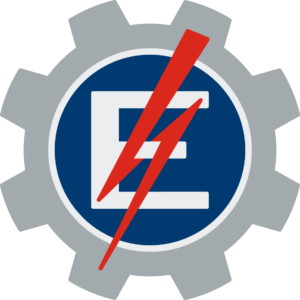
Program Infrastructure
The CTC program has several research and teaching laboratories, as well as extension project laboratories, with the latter being fully funded by private companies. Below is an overview of the research and teaching laboratories:
Research and Teaching Laboratories
- Digital Systems Laboratory – Equipped with 9 workstations, each containing: an Intel i5 computer, an oscilloscope, a function generator, a breadboard, a power supply, educational modules for digital circuit assembly, a digital multimeter, EPLD programming capabilities, and Internet access.
- Digital Electronics Laboratory – Equipped with 8 workstations, each containing: an Intel i5 computer, educational modules for digital circuit assembly, EPLD programming capabilities, and Internet access.
- Analog Electronics Laboratory – Equipped with 6 workstations, each containing: a digital oscilloscope, a function generator, a multimeter, a power supply, a breadboard, and Internet access.
- Computer Networks Laboratory – Includes 2 racks, 1 MaxiTelecom MTS-1024e switch, 1 Cisco 1900 switch, 2 Cisco 2960 switches, 1 Cisco 5505 switch, 3 Cisco 2501 routers, 1 Cisco 2514 router, 3 Cisco 2800 routers, 20 Intel i5 computers, and Internet access.
- Distributed Systems Laboratory – Features a computer cluster from the CTINFRA – PROINFRA 01/2006 – FINEP project, with the following configuration:
- (a) 3 servers, each with: Intel Xeon 5410 2.33GHz processor (two quad-core processors), 12MB L2 cache, 16GB FB-DIMM DDR2 ECC memory, 6x 750GB Serial ATA 3.0 Gb hard drives, 19” widescreen LCD monitor (1280 × 1024 SXGA).
- (b) 48 computers, each with: Intel Core 2 Quad Q6600 processor (2.4 GHz, 8MB L2 cache), 250GB SATA2 7,200rpm hard drive, 2GB DDR2 800 RAM.
- (c) High-speed communication network, including a Gigabit Ethernet switch and Internet access.
- General-Purpose Laboratory (Windows Platform) – 20 Pentium computers with Internet access.
- General-Purpose Laboratory (Linux Platform) – 15 Pentium computers with Internet access.
- Four General-Purpose Laboratories (Windows/Linux Platforms) – Each equipped with 23 Pentium computers and Internet access.
- Mobile Robotics Laboratory – Equipped with:
- 1 Pioneer 3DX robot,
- 1 Festo Robotino robot,
- 3 Amigobot robots,
- 1 didactic articulated manipulator with 5 degrees of freedom,
- 3 Sick laser scanners,
- 1 Hokuyo laser scanner,
- 3 PTZ cameras,
- 5 high-performance PCs,
- Configurable testing arena for mobile robotics experiments, and Internet access.
- Smart Laboratory – 80m² facility, equipped with:
- 13 Apple iMac 21.5” computers (2.7GHz Intel Core i5 Quad-Core, 8GB 1600MHz RAM, 1TB 5400RPM HDD, NVIDIA GeForce GT 640M with 512MB GDDR5).
- 20 Dell Optiplex 7020 computers, each with 16GB RAM.
Extension Project Laboratories
The extension project laboratories were established entirely with private sector funding from partner companies. These companies not only provided funding for laboratory infrastructure but also support research fellowships for students. By the end of 2019, more than half of the research fellowships for students were funded by these private companies.
This financial independence demonstrates the program’s resilience in securing funding, even in adverse scenarios, such as the budget cuts for research and graduate education in 2019. As a result, the program does not solely rely on funding from the university or governmental agencies such as CAPES, CNPq, and FAPEMIG.
The extension laboratories include:
- Public Policy Research Laboratory – This lab hosts 4 master’s students and 2 undergraduate students, equipped with 8 Intel Core i7 notebooks.
- Funded by Lemobs, which invests approximately R$ 100,000 and provides 3 master’s fellowships and 2 undergraduate fellowships.
- Supported by the Urban Resilience Research Center (NEIRU), which manages research projects totaling approximately R$ 4 million, distributed across various institutes and graduate programs.
- Two faculty members and two master’s fellows from the program are engaged in these projects.
- GPESC Laboratory (Systems and Computing Engineering Research Group) – This laboratory conducts research in partnership with Honeywell and DDMX.
- The lab includes 17 individual workstations, 14 Intel i5 computers, 1 monochrome laser printer, 1 T620 server, 1 T420 server, 2 T110 servers, and various specialized software tools, with Internet access.
- Over the past two years, the lab has received approximately R$ 1,100,000 in funding from Honeywell and R$ 100,000 from DDMX.
The CTC program has several research and teaching laboratories, as well as extension project laboratories, with the latter being fully funded by private companies. Below is an overview of the research and teaching laboratories:
Research and Teaching Laboratories
- Digital Systems Laboratory – Equipped with 9 workstations, each containing: an Intel i5 computer, an oscilloscope, a function generator, a breadboard, a power supply, educational modules for digital circuit assembly, a digital multimeter, EPLD programming capabilities, and Internet access.
- Digital Electronics Laboratory – Equipped with 8 workstations, each containing: an Intel i5 computer, educational modules for digital circuit assembly, EPLD programming capabilities, and Internet access.
- Analog Electronics Laboratory – Equipped with 6 workstations, each containing: a digital oscilloscope, a function generator, a multimeter, a power supply, a breadboard, and Internet access.
- Computer Networks Laboratory – Includes 2 racks, 1 MaxiTelecom MTS-1024e switch, 1 Cisco 1900 switch, 2 Cisco 2960 switches, 1 Cisco 5505 switch, 3 Cisco 2501 routers, 1 Cisco 2514 router, 3 Cisco 2800 routers, 20 Intel i5 computers, and Internet access.
- Distributed Systems Laboratory – Features a computer cluster from the CTINFRA – PROINFRA 01/2006 – FINEP project, with the following configuration:
- (a) 3 servers, each with: Intel Xeon 5410 2.33GHz processor (two quad-core processors), 12MB L2 cache, 16GB FB-DIMM DDR2 ECC memory, 6x 750GB Serial ATA 3.0 Gb hard drives, 19” widescreen LCD monitor (1280 × 1024 SXGA).
- (b) 48 computers, each with: Intel Core 2 Quad Q6600 processor (2.4 GHz, 8MB L2 cache), 250GB SATA2 7,200rpm hard drive, 2GB DDR2 800 RAM.
- (c) High-speed communication network, including a Gigabit Ethernet switch and Internet access.
- General-Purpose Laboratory (Windows Platform) – 20 Pentium computers with Internet access.
- General-Purpose Laboratory (Linux Platform) – 15 Pentium computers with Internet access.
- Four General-Purpose Laboratories (Windows/Linux Platforms) – Each equipped with 23 Pentium computers and Internet access.
- Mobile Robotics Laboratory – Equipped with:
- Pioneer 3DX robot,
- Festo Robotino robot,
- 3 Amigobot robots,
- 1 didactic articulated manipulator with 5 degrees of freedom,
- 3 Sick laser scanners,
- 1 Hokuyo laser scanner,
- 3 PTZ cameras,
- 5 high-performance PCs,
- Configurable testing arena for mobile robotics experiments, and Internet access.
13. Smart Laboratory – 80m² facility, equipped with:
- 13 Apple iMac 21.5” computers (2.7GHz Intel Core i5 Quad-Core, 8GB 1600MHz RAM, 1TB 5400RPM HDD, NVIDIA GeForce GT 640M with 512MB GDDR5).
- 20 Dell Optiplex 7020 computers, each with 16GB RAM.
The university’s central library, Biblioteca Mauá – UNIFEI, serves the entire academic community and is also open to the general public. Its total physical space currently covers 2,378.93 square meters, distributed as follows:
- 1,003 m² – Collection storage area
- 335 m² – Reading hall
- 26 m² – CAPES Portal room
- 100 m² – Individual study room
- 46 m² – Group study room
- 54 m² – Administrative area
- 108 m² – Technical processing area
- 284 m² – Entrance hall and event/exhibition space
- 422.93 m² – Service areas (restrooms, circulation areas, etc.)
Library Collection
The primary objective of Biblioteca Mauá is to support UNIFEI’s teaching, research, and extension programs. Its collection is continuously updated through federal funding, donations, exchanges, and partnerships established by various university institutes and departments.
The current collection includes:
- 34,562 book copies
- 17,934 book titles
- 1 subscription to an electronic book database (offering over 400 titles)
- 30 dictionaries
- 358 encyclopedias
- 3,303 technical standards
- 110,453 journal issues (from 1,424 journal titles)
- 6,331 technical brochures
- 13,073 equipment catalogs
- 1,153 instructional booklets
- 1,437 CDs
- 23 DVDs
- 263 videotapes
- 1,900 master’s dissertations and doctoral theses
- 886 undergraduate final projects
Library Services
The library uses the PHL (Personal Home Library) system, allowing users to:
- Search the collection
- Make reservations and renewals online
Additional services include:
- Automated lending system
- Bibliographic information retrieval (COMUT)
- Interlibrary exchange programs
- Access to the CAPES journal portal
- Guidance on academic writing and citation standards
- User training and event promotion
Library Staff and Facilities
The library has a staff of:
- 4 librarians
- 4 administrative assistants
- 3 administrative support staff
- 1 courier
There are 50 computers available for users to access the Internet.
Operating Hours
- Monday to Friday: 8:00 AM – 11:30 AM and 1:30 PM – 10:00 PM
- Saturday: 8:00 AM – 12:00 PM
Funding for Books and Research Materials
Through annual funding opportunities from the Minas Gerais Research Support Foundation (FAPEMIG), the program has successfully acquired key research and teaching materials for its courses.
In the most recent FAPEMIG funding call for technical-scientific book acquisitions, the graduate program received funding to purchase:
- 29 national books
- 55 international books
- Total investment: R$ 14,000.00
About
- Degree: Master
- Capes' Rating: Grade 3
- Duration: 360 hours
- Campus: Itajubá
Coordination
COORDINATOR

Prof. Adler Diniz de Souza
adlerdiniz@unifei.edu.br
DEPUTY COORDINATOR

Prof. Sandro Carvalho Izidoro
sandroizidoro@unifei.edu.br
Scholarship Committee
- Professor Adler Diniz de Souza
- Professor Sandro Carvalho Izidoro
- Professor Melise Maria Veiga de Paula
- Professor João Paulo Reus Rodrigues Leite
- Gustavo Rezende de Almeida
Secretary
- Renata Rocha
- In-person Service: Tuesday, Thursday and Friday from 8AM to 12:30PM and from 1:15PM to 5 PM
- posgrad.imc@unifei.edu.br
- (35) 3629-1738
